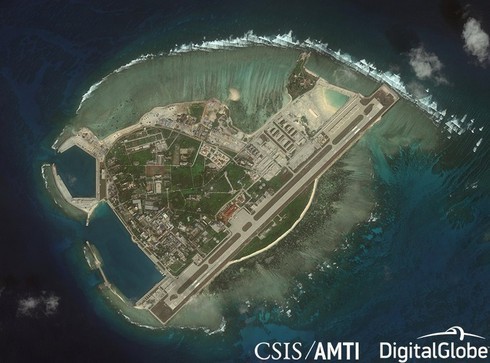 Vietnam’s Woody island is illegally occupied by China. (Photo: CSIS/AMTI) Vietnam’s Woody island is illegally occupied by China. (Photo: CSIS/AMTI) |
China’s Ministry of Civil Affairs said on Friday that the State Council of China has approved the establishment of the so-called Xisha and Nansha districts under the so-called Sansha city in Hainan province.
The Xisha administration will be headquartered on Paracel’s Woody Island while the Nansha administration will be placed on Spratly’s Fiery Cross Reef.
This move seriously violates international law, especially a clear infringement of Vietnam’s indisputable sovereignty and sovereign rights over the two archipelagoes in the East Sea.
The Fiery Cross Reef is one of the seven marine features in Vietnam’s Spratly archipelago where China has illegally built artificial islands and constructed various civilian and military structures in an attempt to control the East Sea.
China’s actions have run counter to their repeated commitment to non-militarization of the East Sea.
Vietnam has reaffirmed its legal sovereignty over Paracel and Spratly, and called on China and concerned parties to respect Vietnam's sovereignty in accordance with international law.
At a regular press conference on March 26, Vietnamese Foreign Ministry spokesperson Le Thi Thu Hang stressed, “Vietnam has repeatedly stated it has sufficient historical and legal evidence of its sovereignty over Paracel and Spratly archipelagoes in line with international law. As a result all activities that take place there must be subject to permission being granted by Vietnam.”
“Vietnam asks China to respect Vietnam’s sovereignty by not taking action to increase tensions, complicate the situation, and affect peace and stability in the East Sea and the region, as well as the countries’ ongoing efforts in negotiating the Code of Conduct in the East Sea between ASEAN and China,” she said.